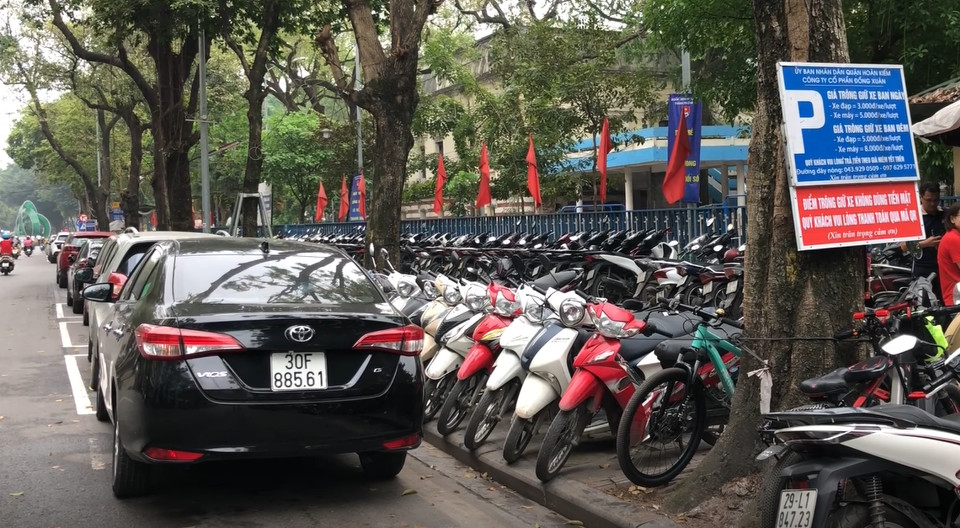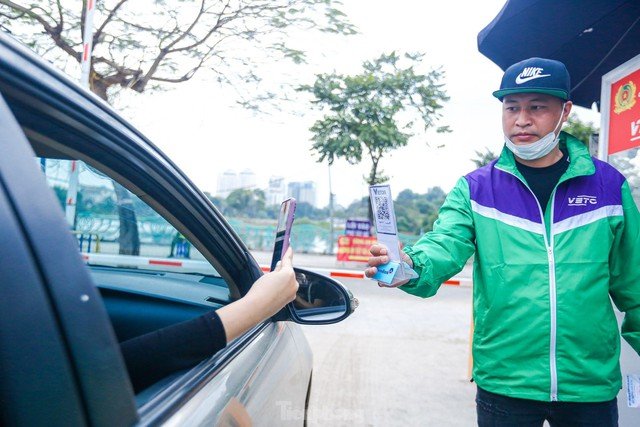Positive response to cashless car parking in Hanoi
Parking fees are billed correctly, which eliminates illegal surcharges or charging without an invoice.
Hanoi's seven cashless car parks in Hoan Kiem District have received positive feedback from drivers after more than one month.
To pay parking fees, passengers need to have a transport account (ETC) or an online bank account (payment by scanning QR codes).
"The payment is so convenient; the staff is very enthusiastic in supporting it. It makes the payment of parking fees more transparent and prevents extortion. It will be good if the city has more cashless car parks," Tran Xuan Luan, 38, from Bac Tu Liem District, told The Hanoi Times.
QR code for the payment of parking fees to the account of the car park operator. Photos: Anh Kiet/The Hanoi Times |
Le Thi Nhung, a teacher from Ha Dong District, said: "The application of technology and support solutions has brought people a positive experience when parking their cars. The cashless parking fee is convenient as I don't need to carry cash when I go out."
Meanwhile, Pham Tien Dat, a student from Cau Giay district, told The Hanoi Times: "Cashless payment helps me pay faster. It also helps to accurately control vehicles entering and leaving the car parks. Parking fees are billed correctly, which eliminates illegal surcharges or charging without an invoice".
According to Nguyen Duc Vinh, Deputy General Director of Hanoi Vehicle Parking Operator Limited Company, they are currently using the radio-frequency identification (RFID) technology (the technology used in the ETC non-stop automatic toll collection system) to detect fake licence plates and to control vehicles entering and leaving car parks.
Signage for cashless parking. |
He told The Hanoi Times that the cashless parking pilot aims to ensure charging the right price, transparency, good service quality, convenient "non-stop" entry and exit, easy search for available parking, reduce time costs, combat tax loss, make the business efficient and sustainable.
He pointed out that with almost eight million vehicles in the city, the demand for parking is huge, especially in the city center. However, the limited land reserves for parking have turned out to be an opportunity for individuals and organisations to profit by illegally inflating parking fees.
"Although the parking fee is published, some car parks have deliberately ignored the rules and charged higher fees. The cashless system is how the Hanoi Department of Transport plans to tackle the problem," Vinh said.
Car park staff use handheld card readers, RFID technology that identifies Etag tags attached to vehicles, and licence plate recognition. |
"In Vietnam, RFID technology has already been successfully applied at motorway toll plazas. With the experience of highway toll collection, the implementation of cashless payment at car parks is quite convenient and smooth," Kien told The Hanoi Times.
He emphasized that in the little more than two weeks that it has been in place, this method of payment has proved to be beneficial and well accepted by drivers.
"After a pilot of cashless payment in car parks around Hoan Kiem Lake, 100% of car drivers used it, while the rate for motorcycles was between 90-95%," Kien quoted a report by the Hanoi Department of Transport as saying.
One of the cashless car parks in Hoan Kiem District. Photo: VGP |
Traffic expert Le Trung Hieu said that if the city does not review spontaneous parking, it will find it difficult to strengthen management and collect fees for the budget.
"Besides, the unfair competition between licensed and unlicensed parking places will also discourage many honest businesses, so they may find ways to circumvent the law," Hieu told The Hanoi Times.
According to Phan Truong Thanh, Head of the Financial Planning Department of Hanoi's Department of Transport, cashless payment will improve government management by controlling revenues and preventing budget losses, help businesses reduce human resources, and make statistical work much easier and more convenient. It will form the basis of an intelligent digital map of Hanoi, making it easier to find parking spaces throughout the city.
Thanh talked to The Hanoi Times that the biggest difficulty in implementing a cashless payment system is the large number of unregistered car parks, which account for 90% of all car parks in the city.
A turning point in helping to build a smart transport system
Nguyen Duc Vinh, Deputy General Director of Hanoi Vehicle Parking Operator Limited Company said the company has made a plan to use this method of payment in all car parks under their management.
VETC will continue to improve the technology to make it easier for people to use cashless payment in car parks. Photo: VGP |
"It is necessary to issue standards for the application of technology so that it is effective and consistent when applied throughout the city. The move aims to ensure efficiency in government management and transparency in parking fee collection, and to move towards building an intelligent transport system for Hanoi," Kien told The Hanoi Times.
A report by the Hanoi Department of Transport showed that there are currently 57 licensed parking areas located in commercial centres, residential areas, hospitals and schools; 639 parking spaces with a total area of about 135,000 square metres. Most of the licensed parking facilities charge for their services in cash.
Nguyen Phi Thuong, Director of the city's Department of Transport, said the use of technology will help improve Hanoi's reputation, image and brand.
"The application of technology is considered suitable for the traffic in Vietnam. The cashless car parking aims to build a smart digital map of parking lots across the city, which helps drivers easily find a parking spot in a short time, moving towards building a smart traffic system," Thuong added.


.jpg)
.jpg)
.jpg)











